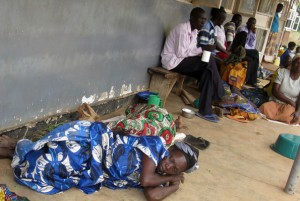By Agnes Kyotalengerire
At birth, Gloria Nalumansi examined her newborn baby and everything seemed fine. However, she did not bother to also examine the baby’s genitals. Two months later, Nalumansi’s mother in-law discovered that the boy had one testis. Nalumansi immediately consulted a doctor and it was confirmed that the boy had a condition medically referred to as undescended testes.
Dr. John Sekabira, a paediatric surgeon at Mulago Hospital, says sometimes, the congenital condition is missed by medical workers and parents at birth.
He defines undescended testes as a condition where the testes fail to move into the scrotum (a bag that contains testicles).
Under normal circumstances, testes develop early when a male foetus is being formed and are located in the abdominal cavity. Between 28 and 32 weeks, the testes descend gradually into the scrotum, followed by a sac containing fluid, which later dissolves.
Sekabira says for some children, the fluid does not dissolve, causing a condition called a hydrocele. In others, the testes do not reach down the scrotum and the sac remains open, resulting in a hernia (rupture in muscle tissue through which a bodily structure protrudes).
Causes
l Abnormalities in the testes.
l Insufficiency of maternal hormones that stimulate descent.
l Premature birth, where a baby is born before the testes fully descend.
Prevalence
Sekabira says about 10 out of the 80 children at the surgical out-patient clinic in Mulago Hospital have undescended testes.
Signs
Daisy Ssenyange, a senior midwife at Mengo Hospital, says an empty scrotum, upon feeling, is a common sign, followed by a swelling or pain in the groin (the area between the abdomen and the thighs). The hernia is noticeable when the child is upright, straining, coughing, crying or laughing. These signs indicate that the testicles have logged in the abdomen wall, appearing as a lump in the groin.
“Although some children present with hernia, after being examined, doctors may discover an undescended testis,”Ssenyange explains.
Diagnosis
Ssenyange says the baby’s testes should be felt at birth. In the event that an undescended testis is discovered, the baby is monitored every time the mother goes for post-natal check-up. Fortunately for most boys, the testes descend during the first nine months.
In case of failure to descend by one year, the condition is corrected surgically. If the testes cannot be felt on both sides, a laparoscopy (a small incision to examine the abdominal cavity) is done to establish whether or not the child has testes.
Complications
Sekabira says the testes are primarily responsible for making hormones. After puberty, the testes produce both hormones and sperm. Sometimes children with undescended testes develop complications. A testis that remains in the abdomen may undergo twisting, causing pain and if not treated, may result in death. If the testes have not descended, this compromises their functionality.
In addition, when both testes are affected, the child is at risk of infertility. Worse still, when the testis is left inside the abdomen, it may form a tumour later in life.
Treatment
A child with undescended testes can only be treated after one year because the baby’s organs would have matured enough to withstand the stress of surgery.
If the spermatic cord and vessels are long enough, they are brought down and the testes descend. Alternatively, if they are short, the procedure is done in stages. Surgery is free at Mulago Hospital.
Sekabira advises that a baby’s genitals be reviewed thoroughly at birth to confirm that the testes are in their normal position in the scrotum.
with hernia, after being examined, doctors may discover an undescended testis,”Ssenyange explains.
Source: http://www.newvision.co.ug/news/640978-undescended-testes-have-you-checked-your-baby.html

